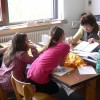Interview with Lilo Nold
Lilo is an assistant for reading skills at an elementary school
Interview conducted by: Paula Schweinberger, ViLE e.V., Germany
Paula: Dear Lilo, 2011 is the year of the social engagement. I know you as a very active woman who also likes helping other people. How did you come to your engagement?
Lilo: It is about 1 ¼ years ago that I read the following headline in the newspaper: “Tuition wanted for future bookworms.” They were looking for reading assistants, because we know that there are less and less children, to whom anybody reads aloud, who don’t even have books. The advertising drum was stirred by the head of the city library. As I had already been asking myself for a long time what I could contribute to society after my professional activity, I immediately picked up the phone and had a first interview, during which I came to the conviction: “I’m sure that’s it.”
Paula: What was the general reaction to this advertisement?
Lilo: Some more thirty ladies and gentlemen applied and we were invited to attend a first meeting at the public library. The candidates were then sent to four schools. In early February 2010, I held my first reading lesson.
Paula: Which aims do you pursue in this project?
Lilo: The children are supposed to become familiar with books. We want to raise the joy of reading and listening – and at the same time the ability of concentrating will be strengthened. The cultivation of the German language not only promotes success at school, but also is an advantage in later life.
Paula: How have you been prepared for this challenging task?
Lilo: A previous professional training was offered concerning voice training and pedagogic skills. But it did not necessarily make things easier, because you don’t read out ingeniously anymore. The texts we read and the organization of the lesson is up to us. We are free of charge to borrow books from the library.
Paula: Please tell us something about the organization of a lesson!
Lilo: To prepare my first lesson I borrowed about ten books and then I decided to read the story about a snowman, because it fit into the season.
As I wanted to make the reading lesson more attractive, I produced four snowmen out of sweets, which I distributed as a reward at the end of the lesson. For the next meeting I chose a story about bears and baked little bears – prettily decorated with Smarties.
Paula: You know how to fascinate the children. What other methods do you use?
Lilo: I always try to find books with which I can combine a “social program.” Since I found out that my girls like drawing, I suggest they should draw a picture for me for the next meeting about the story we have read. Thus I know whether they have been listening carefully or not. For me the reading out has priority, if however the children want to read themselves, then of course I let them do so.
Paula: Do you remember a special “highlight?”
Lilo: The children were extremely happy when we went to the near park last summer and had our reading lesson there under a shadowy tree; the ice-cream I had brought for them was the absolute hit.
Paula: What happens when situations are troublesome or difficult?
Lilo: Our reading lesson is the last hour in a full-time class, and is therefore strongly influenced by the disposition of the children. Sometimes they are upset or exhausted when they come to me; I must be prepared for that. There are days when I can’t get the “naughty” kids under control – but I know that it will be better next time.
Paula: Lilo, where do you get your motivation and the power for your work from?
Lilo: After my professional career, I finally have the chance of coming in contact with children and taking part in their joys and sorrows. It is a great pleasure for me to prepare each lesson carefully. When the children are running out of classroom towards me with great enthusiasm, I feel that they are very happy to meet me. Then I’m confirmed that I’m doing something significant for me and the children.
Paula: What do you personally expect for the future?
Lilo: I hope that this project which started one year ago will continue for a long time – for the benefit of the children and the volunteers. For both it seems to be useful and satisfying.
Paula: Lilo, thank you so much for this informative interview.


 April 28, 2011
April 28, 2011 



No comments yet... Be the first to leave a reply!